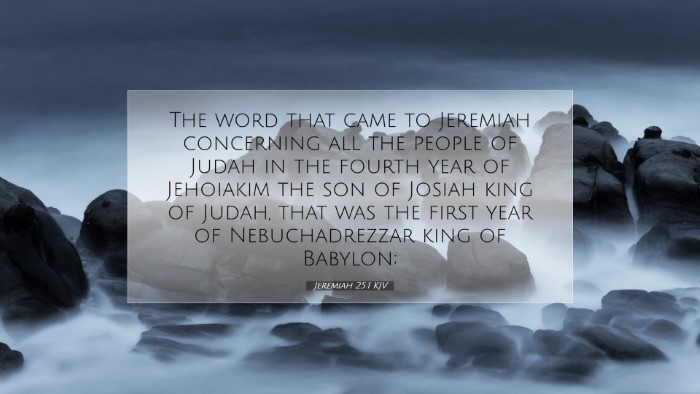Commentary on Jeremiah 25:1
Verse Overview: Jeremiah 25:1 states, “The word that came to Jeremiah concerning all the people of Judah, in the fourth year of Jehoiakim, the son of Josiah, king of Judah, that was the first year of Nebuchadnezzar king of Babylon.” This verse sets the stage for a crucial chapter in the prophetic ministry of Jeremiah, marking significant historical and theological themes.
Historical Context
In this verse, Jeremiah's prophetic call occurs in a pivotal moment when Jehoiakim ruled over Judah, a time coinciding with the Babylonian ascendancy under Nebuchadnezzar. This timeframe, approximately 605 B.C., signals a transition in the political landscape, which becomes central to Jeremiah’s prophecies.
- Jehoiakim’s Reign: Jehoiakim was known for his unrighteous leadership and rebellion against God. His actions brought about severe repercussions for Judah, aligning with the prophetic messages Jeremiah delivered.
- Babylon’s Rise: The Babylonians were imposing their influence, and Jeremiah’s contemporaneous message would warn the people of the impending judgment that would stem from their unfaithfulness.
Prophetic Significance
This verse not only introduces the timing of Jeremiah’s message but also emphasizes the breadth of the prophecy, directed toward all the people of Judah. The inclusiveness suggests impending judgment and calls for accountability among the people.
- Universal Accountability: Jeremiah's prophecy reminds us that God’s message extends to all people, irrespective of their social or religious status, thereby emphasizing the egalitarian nature of divine judgment.
- Crisis Prophecy: The impending Babylonian threat serves as a catalyst for a call to repentance. Jeremiah’s role remains pivotal as a voice of warning amidst political upheaval.
Theological Themes
Jeremiah 25:1 encompasses prominent theological themes which are vital for understanding the narrative progression of prophetic literature.
- God’s Sovereignty: The mention of Nebuchadnezzar signifies God’s sovereign plan unfolding through earthly powers. As noted by commentators:
- Matthew Henry stresses that God utilizes even unrighteous rulers to accomplish His purposes.
- Albert Barnes points out that God’s supremacy is reflected in directing nations to fulfill His will, regardless of their moral standing.
- Judgment and Mercy: Though a somber warning, the purpose of divine communication remains rooted in the ultimate hope of restoration post-judgment.
- Jeremiah’s role as a prophet embodies both God’s message of judgment and His desire for reconciliation, a duality that demonstrates God’s nature.
Application for Today
The insights from Jeremiah 25:1 provide lasting lessons for contemporary readers, including pastors and theologians. The themes found within the text challenge listeners to re-evaluate their fidelity to God amidst political and social turmoil.
- Call to Accountability: Just as Jeremiah admonished Judah, modern followers of Christ must assess their actions and their alignment with God’s will.
- Embrace of Prophetic Voices: The church today is called to heed the prophetic messages that challenge complacency and encourage a deeper faith commitment.
- Sovereign Trust: In times of uncertainty, believers should hold onto the understanding that God is sovereign over human history, using even crises to fulfill divine purposes.
Conclusion
Jeremiah 25:1 serves as an important reminder for all—pastors, students, and scholars—about the relevance of ancient texts in light of modern realities. The study of this verse encapsulates themes of divine sovereignty, accountability, and the hope of restoration. By reflecting on these insights, individuals can deepen their understanding of God’s workings in both ancient and contemporary contexts, urging a responsive heart toward His calling.


